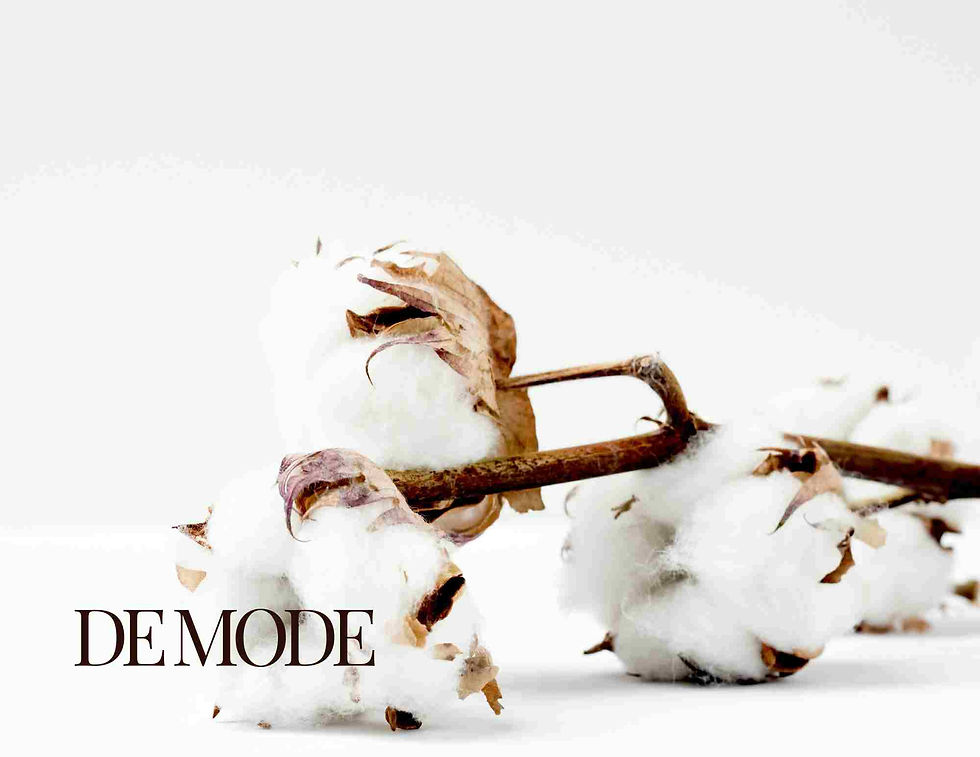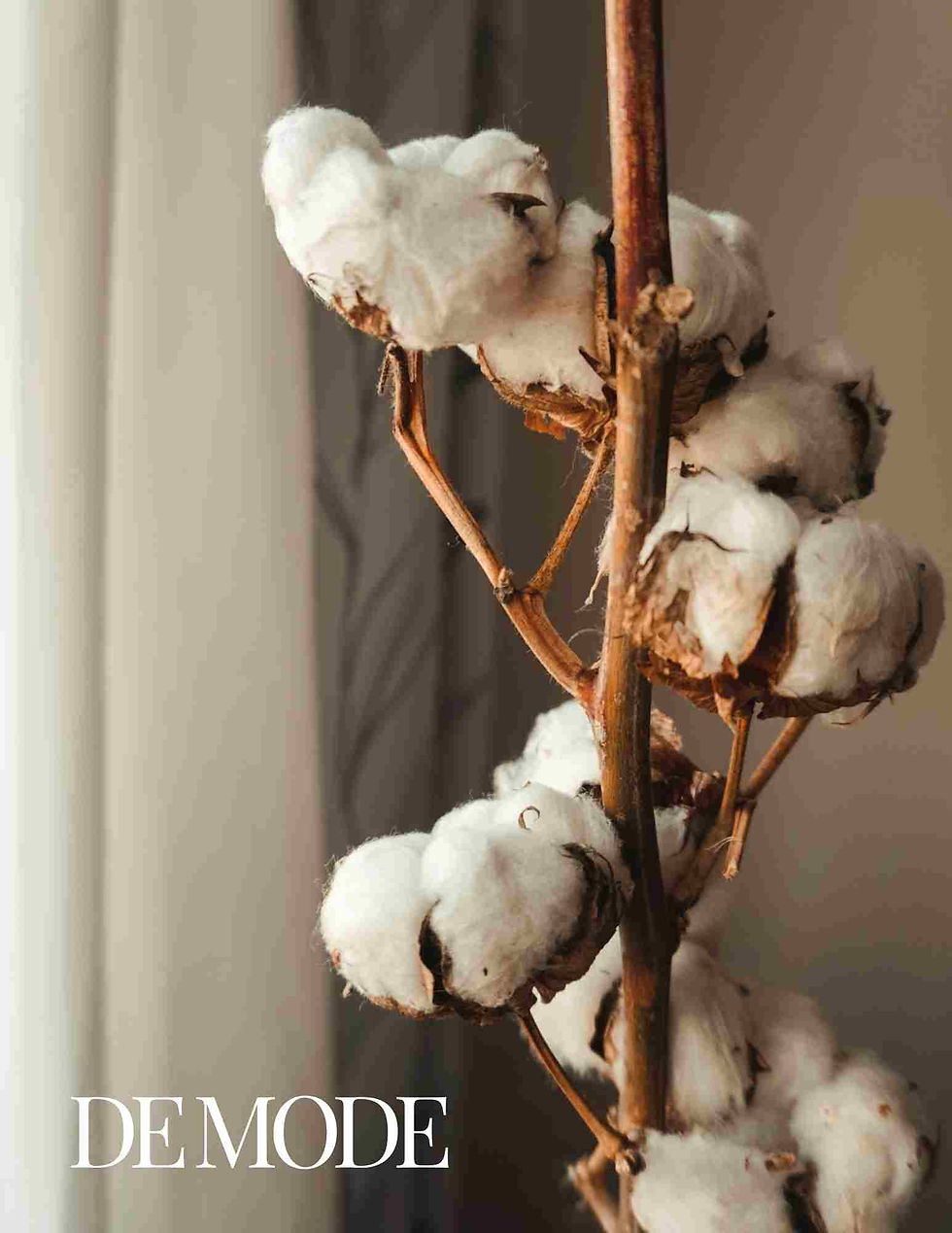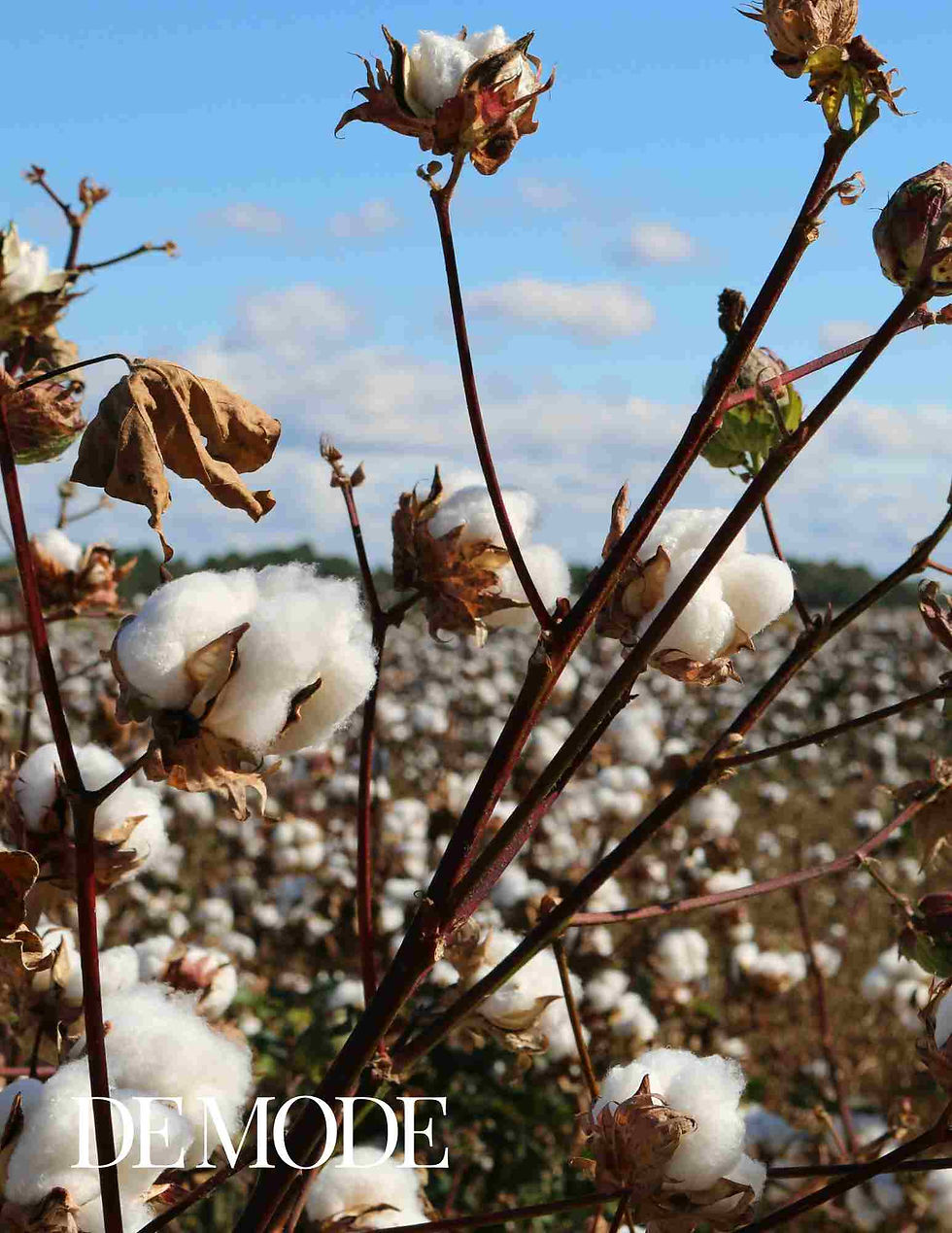ORIGINALLY PUBLISHED IN DE MODE | WORLD COTTON DAY
Article Published on: 07TH OCT 2024 | www.demodemagazine.com
World Cotton Day, celebrated annually on October 7th, is a significant global event that highlights the immense economic, social, and cultural importance of cotton. It is a day dedicated to raising awareness about cotton's role in the lives of millions of people across the globe, from farmers to fashion designers and consumers. Cotton is one of the most widely used natural fibers, playing a vital role in the economies of developing nations while also being a symbol of sustainability and tradition. As the world faces challenges related to climate change, trade, and social inequality, World Cotton Day also provides a platform to discuss the future of cotton production and its potential in advancing sustainable practices.
The History and Significance of World Cotton Day
World Cotton Day was established in 2019 by the World Trade Organization (WTO), in partnership with key organizations such as the United Nations Conference on Trade and Development (UNCTAD), the International Cotton Advisory Committee (ICAC), and the International Trade Centre (ITC). The initiative originated from a proposal by the “Cotton-4” countries: Benin, Burkina Faso, Chad, and Mali, which are among the leading producers of cotton in Africa. These countries rely heavily on cotton exports for their economic well-being, and World Cotton Day was created to promote the fiber's contribution to the world economy and raise awareness of the challenges faced by cotton farmers, especially in developing nations.
The day aims to celebrate the significance of cotton in global trade, promote sustainable cotton production, and advocate for fair trade practices that protect small-scale farmers. It is also an opportunity to showcase cotton’s versatility, as it is used not only in textiles but also in industries such as food (cottonseed oil) and personal care products (cotton swabs and wipes).

Cotton’s Economic and Social Importance
Cotton plays a crucial role in the global economy, supporting the livelihoods of hundreds of millions of people across the world. It is one of the most important cash crops in many developing countries, especially in Africa and Asia, where cotton farming provides employment to millions of smallholder farmers. In fact, cotton is grown in over 75 countries on five continents, with India, China, the United States, Pakistan, and Brazil being the top producers.
For many farmers, cotton is not just a crop; it is their main source of income and financial security. Cotton farming also supports numerous related industries, from textile manufacturing to retail and fashion. The cotton value chain is vast, providing employment at various levels, from agriculture to processing, transportation, and sales. This makes cotton an essential commodity for economic development, particularly in rural areas of developing nations.
In addition to its economic value, cotton has deep cultural and historical significance. It has been cultivated for thousands of years, with evidence of cotton farming dating back to ancient civilizations in India, Peru, and Egypt. Cotton textiles have been an integral part of trade and industry, playing a major role in the Industrial Revolution and the global trade network that connected the world’s economies.
Cotton and Sustainability
One of the key themes of World Cotton Day is sustainability. As the demand for eco-friendly and ethically produced textiles grows, cotton’s role in sustainable fashion and agriculture has come under the spotlight. Cotton is a natural, biodegradable fiber, which makes it more environmentally friendly than synthetic alternatives like polyester and nylon, which are petroleum-based and contribute to plastic pollution.
However, despite its natural benefits, cotton farming has been associated with significant environmental challenges, including high water usage, soil degradation, and pesticide use. Conventional cotton farming is often water-intensive, particularly in arid regions, and the overuse of chemical fertilizers and pesticides can lead to soil depletion and water pollution.
To address these concerns, the cotton industry has increasingly focused on promoting sustainable and organic cotton production practices. Organic cotton is grown without synthetic chemicals and uses more environmentally friendly methods such as crop rotation and composting to maintain soil health. It also tends to use less water than conventional cotton farming, making it a more sustainable option.
Programs like the Better Cotton Initiative (BCI) have been created to encourage more sustainable cotton production. BCI works with farmers to promote practices that reduce environmental impact and improve working conditions for cotton farmers. The initiative has helped cotton farmers adopt more efficient water management techniques, reduce pesticide use, and implement better labor practices.
Additionally, technological advancements in precision agriculture are helping farmers optimize water and fertilizer use, improving yields while minimizing environmental harm. As awareness of sustainability grows, both consumers and companies are increasingly demanding cotton products that are ethically sourced and produced using environmentally friendly methods.

Fair Trade and Ethical Cotton Production
One of the pressing issues highlighted on World Cotton Day is the need for fair trade and ethical cotton production. Cotton farmers, particularly in developing countries, often face challenges such as fluctuating market prices, unfair labor practices, and a lack of access to modern farming technology. These challenges can trap farmers in cycles of poverty, as they struggle to make a sustainable living from their crops.
Fair trade initiatives aim to address these challenges by ensuring that cotton farmers receive fair prices for their products and are not exploited by intermediaries or multinational corporations. Fair trade cotton is grown by small-scale farmers who are paid a premium price for their cotton, which helps them invest in their communities and improve their quality of life.
Fair trade certification also ensures that farmers work under safe and fair labor conditions, without child or forced labor, and that they follow sustainable farming practices. This helps empower farmers and workers while promoting environmental responsibility. Brands that source fair trade cotton are committed to supporting ethical practices throughout the supply chain, from the farm to the finished garment.
World Cotton Day serves as an important reminder for consumers to consider the impact of their clothing purchases. By choosing fair trade or organic cotton products, consumers can help support ethical production and contribute to the livelihoods of farmers in developing countries.
Celebrating Cotton’s Versatility and Innovation
Beyond its economic and environmental significance, cotton is celebrated for its versatility and the wide range of products it creates. Cotton’s softness, breathability, and durability make it a popular choice for clothing, from casual wear to high fashion. In addition to textiles, cotton byproducts are used in various industries, including food, personal care, and even medical supplies.
Cottonseed oil, a byproduct of cotton production, is used in cooking and food processing, while cotton lint is used in products such as cotton balls, swabs, and gauze. Cotton is also used in industrial applications, such as in the production of paper and plastic substitutes, making it a vital commodity for many sectors of the economy.
Innovation in the cotton industry is also driving new uses and technologies. Sustainable cotton production techniques, such as water-saving technologies and genetically modified cotton that requires fewer pesticides, are helping to reduce the environmental footprint of cotton farming. At the same time, designers and manufacturers are exploring new ways to recycle cotton and reduce waste, creating a circular economy for cotton textiles.

Conclusion
World Cotton Day is a celebration of cotton’s global importance, from its role in supporting the livelihoods of millions of people to its significance in sustainable fashion and agriculture. As the world faces growing environmental and social challenges, cotton’s future lies in adopting sustainable and ethical practices that benefit both farmers and consumers. By recognizing the contributions of cotton to the global economy and supporting fair trade and eco-friendly initiatives, we can ensure that this vital fiber continues to thrive for generations to come.